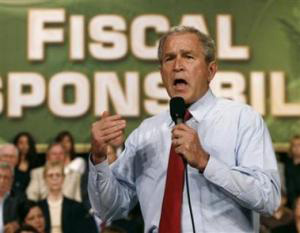 |
 |
 |
 News from Around the Americas | October 2007 News from Around the Americas | October 2007  
Voters Mad at Bush AND Congress
 John C. Whitesides - Reuters John C. Whitesides - Reuters
go to original


| | President Bush (Reuters) |
Deepening unhappiness with President George W. Bush and the U.S. Congress soured the mood of Americans and sent Bush's approval rating to another record low this month, according to a Reuters/Zogby poll released on Wednesday.

The Reuters/Zogby Index, which measures the mood of the country, also fell from 98.8 to 96 -- the second consecutive month it has dropped. The number of Americans who believe the country is on the wrong track jumped four points to 66 percent.

Bush's job approval rating fell to 24 percent from last month's record low for a Zogby poll of 29 percent. A paltry 11 percent gave Congress a positive grade, tying last month's record low.

"There is a real question among Americans now about how relevant this government is to them," pollster John Zogby said. "They tell us they want action on health care, education, the war and immigration, but they don't believe they are going to get it."

The dismal assessment of the Republican president and the Democratic-controlled Congress follows another month of inconclusive political battles over a future path in Iraq and the recent Bush veto of an expansion of the program providing insurance for poor children.

The bleak mood could present problems for both parties heading into the November 2008 election campaign, Zogby said.

"Voter turnout could still be high next year, but the mood has turned against incumbents and into a 'throw the bums out' mindset," Zogby said.

The national telephone survey of 991 likely voters, conducted October 10 through October 14, found barely one-quarter of Americans, or 26 percent, believe the country is headed in the right direction.

The poll found declining confidence in U.S. economic and foreign policy. About 18 percent gave positive marks to foreign policy, down from 24 percent, and 26 percent rated economic policy positively, down from 30 percent.

A majority of Americans still rate their personal financial situation as excellent or good, although the number dipped slightly this month to 54 percent from 56 percent. In August, 59 percent rated their finances as excellent or good.

"Americans are still feeling good about a number of things in their lives, but not about the government's leadership," Zogby said. "They are giving up on this government."

The Index, which made its debut last month, combines responses to 10 questions on Americans' views about their leaders, the direction of the country and their future. Index polling began in July, and that month's results provide the benchmark score of 100.

A score above 100 indicates the public mood has improved since July. A score below 100 shows the mood has soured, and a falling score like the one recorded this month shows the nation's mood is getting worse.

The RZI is released the third Wednesday of each month.

In the 2008 White House race, Sen. Hillary Clinton of New York tightened her grip on the top spot in the Democratic nomination race with the support of 46 percent, up from 35 percent last month.

Her top rival, Sen. Barack Obama of Illinois, was at 25 percent, moving up slightly from last month's 21 percent. Former Sen. John Edwards of North Carolina was third with 9 percent, and about 12 percent of Democratic voters were unsure of their choice.

Among Republicans, former New York Mayor Rudy Giuliani expanded his lead over Fred Thompson, the former senator and Hollywood actor. Giuliani led Thompson 28 percent to 20 percent, compared to last month's 26 percent to 24 percent.

Former Massachusetts Gov. Mitt Romney jumped from 7 percent to 14 percent and moved past Arizona Sen. John McCain into third place. McCain fell from 13 percent last month to 8 percent.

More Republicans, 18 percent, said they had not made up their mind, leaving room for more shifts in the field. "We still have one in five Republicans undecided. That race is really up in the air," Zogby said.

A majority of voters asked about former Vice President Al Gore said he should not run for the White House in 2008 despite winning the Nobel Peace Prize. About 51 percent said he should not enter the race and 40 percent said he should.

The Nobel award on Friday came halfway through the polling period. The Gore question was asked of 485 likely voters with a margin of error of plus or minus 4.5 percent.

The rest of the national survey had a margin of error of plus or minus 3.2 percentage points. | 
 | |
 |



